
 |
|
|
 |
|
| About Us |
|
Read Past Issues | Resources | Composer Links |
|
ELECTRONIC
DIALOGUE/15
An Interview with Tobias Picker
|
|
|
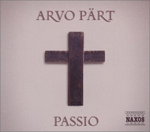 . .
Passio Composer: Arvo Part Performers: Tonus Peregrinus/Antony Pitts, director Naxos Arvo Part’s Passion of our Lord Jesus Christ according to John is widely regarded as one of the most significant choral works of the 20th century. Born in Estonia in 1935, Part studied at the Tallinn Conservatoire, his early compositions strongly influenced by Russian music from the Shostakovich era. Thirty years ago, he began to embrace polyphonic forms linked with Gregorian chant. Passio echos the earliest American minimalism, with short melodic and rhythmic patterns repeated to form a more extensive narrative. The British-based vocal ensemble, Tonus Peregrinus performs solidly. Another great bargain from Naxos |
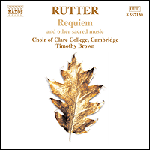
Requiem and other Sacred Music Composer: John Rutter: Performers: Choir of Clare College, Cambridge / Timothy Brown, director Naxos John Rutter's gentle Requiem, written in 1985, was composed with a special affection for choral sound. If you prefer the quiet requiem of Fauré to the bombastic requiem of Verdi, you will love Rutter's work, created from a personal selection of texts, some from the Requiem Mass and others from the l662 Book of Common Prayer.
|
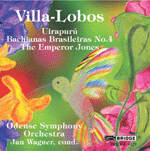
Uirapurú, Bachianas Brasileiras No. 4, The Emperor Jones (Premiere Recording) Composer: Heitor Villa-Lobos Performers: Odense Symphony Orchestra, Jan Wagner, conductor BRIDGE 9129 For years, Villa-Lobos was regarded by many as a minor composer who wrote terrific little pieces for the guitar. Not anymore. A veritable explosion of recordings of orchestral works shows Villa-Lobos to have been one of the 20th century’s giants. These vibrant performances of some of the less recorded Villa-Lobos works are a jaw-dropping revelation of music at its most romantic and sublime. |
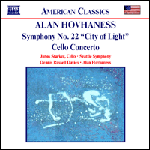
Concerto for Cello and Orchestra, Op. 17 Symphony No. 22, Op. 236, "City of Light" Composer: Alan Hovhaness Performers: Seattle Symphony Orchestra, Starker, Davis Naxos A premiere of Hovhaness’s 1936 Concerto for Orchestra and a return to print from a previous Delos release of the City of Light Symphony, conducted by the composer himself. Hovhaness was a pioneer of that East/West fusion that has become part of the common currency of contemporary music and his music is neither as easy to love as detractors claim nor as profound as adherents would have it. Like Martinu, Hovhaness wrote a lot of music and virtually all of it is of a high quality. Nothing wrong with that. |
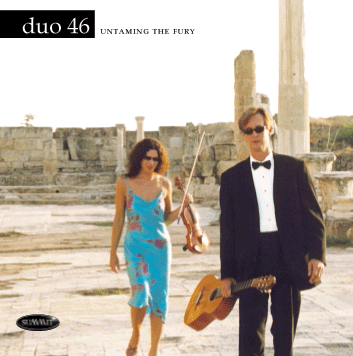
Untaming the Fury New American Music for Guitar and Violin Summit Records SMT-346 As Duo46, guitarist Matt Gould and violinist Beth Ilana Schneider make exciting music together. On this CD, they work their magic on ten pieces specially commissioned from composers who are not household names yet--but all of whom display great potential. Gould and Schneider are polished players who imbue these short works with a full-range of emotional context.
|
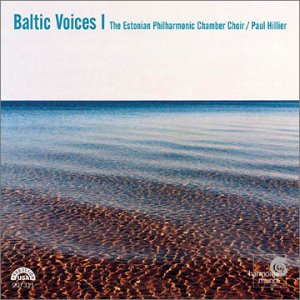
Baltic Voices 1 Composers: Arvo Pärt, Einojuhani Rautavaara, et al. Conductor: Paul Hillier Estonian Philharmonic Chamber Choir Harmonia Mundi Franc - #907311 Paul Hillier leads the Estonian Philharmonic Chamber Choir in Volume 1 of Baltic Voices — a three-year project to explore the choral riches of the Baltic Sea countries. With a special attention to the choir’s native Estonia, these recordings will highlight the mainstream tradition of the past hundred years, complemented with music of earlier periods and commissions from younger composers. Volume 1 features haunting secular and sacred works by 20th-century composers Cyrillus Kreek, Arvo Pärt, Einojuhani Rautavaara, Sven-David Sandstrøm, Peteris Vasks, and Veljo Tormis. Cool, ethereal, other worldly music from a hot bed of great contemporary composers. |

Awakening at the Inn of the Birds, etc. Composer: Michael Byron Performers: FLUX Quartet, Sarah Cahill, Joseph Kubera, and Kathy Supove Cold Blue Music CB0012 Michael Byron blends minimalist and maximalist techniques and rigorous processes with freely composed music to create works that range from the hynotic to the boisterous. Continents of City and Love and Tidal, written 20 years apart, are both arch-form pieces scored for two pianos, synthesizer, string quartet, and doublebass. This new CD collects four of Byron’s very recent works and a new recording of a piece from 1981, all performed by some of today’s most-respected new-music champions, including Sarah Cahill and Joseph Kubera on pianos, Kathleen Supové on synthesizer, and the FLUX Quartet. |

Level 7 Composer: Evan Ziporyn, et al. Performer: The Robin Cox Ensemble The Robin Cox Ensemble is a unique new music group that combines violin, cello, percussion, and live electronics to create vivid performances of new music. In its first three years, this quartet with a one-of-a-kind instrumentation has already staged more forty performances and collaborated with many prominent choreographers and composers, including on this--the group's second CD--the marvelous Evan Ziporyn. |
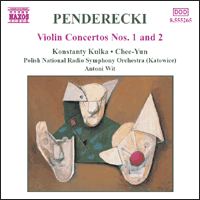
Orchestral Works 4 Composer: Krzysztof Penderecki Peformers: Chee-Yun, violin; Wit, Polish Nat'l Rso, Naxos The two violin concertos presented here are from the 1970s when Penderecki returned from strict modernism to more traditional modes of composition. The first concerto dates from 1977, and was written for Isaac Stern, its solo writing containing prodigious technical difficulties. The second is not much easier but both violinists on this CD produce lively, impressive accounts. |
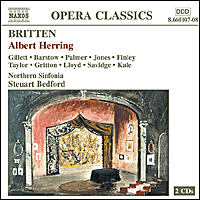
Albert Herring Composer: Benjamin Britten Performer: Bedford, Northern Sinfonia Naxos - In which young Albert Herring, the May King (apparently no female virgin could be found to serve as Queen) is taken into hand by the lovers Sid and Nancy, fortified with rum, and treated to a night on the town where he does--or does not--lose his virtue. Wonderful, gay comedy and beautifully sung. |

Complete Orchestral Works 3 Composer: John Carbon Conductor: Vladimir Valek, Marin Alsop, et al. Mmc Records - #2120 Recent recordings of Carbon's dazzling Violin Concerto, performed by Violinist Peter Zazofsky with Gerhardt Zimmermann conducting the Warsaw National Philharmonic Orchestra; also a marvelous reading by Richard Stoltzman of Carbon's Clarinet Concerto, and Notturno for Trumpet, Harp, and Strings, performed by Gerard Schwarz (with Jeff Silberschlag on trumpet) and the Seattle Symphony. Valuable recording of an unjustly neglected composer. |
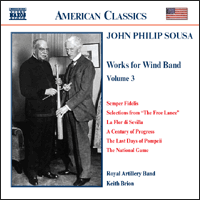
Works for Wind Band 3 Composer: John Philip Sousa Performer(s): Brion, Royal Artillery Band Naxos Born in Washington DC on 6 November, 1854, the father of American march music was the son of a trombonist with the United States Marine Band and a true prodigy. He began music lessons at age six and by the age of eleven he organized and led his own ‘quadrille orchestra’. The rest of his orchestra consisted of seven grown men and quickly became a popular dance orchestra in the Washington area. At the age of 25, he was chosen to become Director of the United States Marine Band in Washington. He began leading the Marine Band in January 1880, beginning a fabled 52 year career as a bandmaster. |
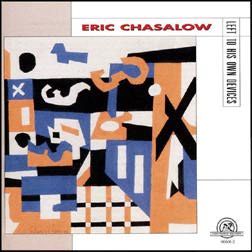
Left to His Own Devices Composer: Eric Chasalow New World Records - #80601 Eric Chasalow is Professor of Composition, and Director of BEAMS, the Brandeis Electro-Acoustic Music Studio. Two of the seven electro-acoustic works on this disc--Left to His Own Devices and Suspicious Motives--pay homage to his Columbia-Princeton mentors; the former is built from vocal samples of Milton Babbitt and the sound of the RCA synthesizer while the latter incorporates two motives from Davidovsky’s music—primarily the opening to Synchronisms #6. Notable also are two purely acoustic chamber pieces, In the Works and Yes, I Really Did, which reveal a consistency of vision across both musical frontiers. |
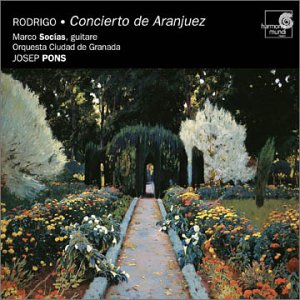
Concierto De Aranjuez / Fantasia Para Gentilhombre Performers: Socias, Pons, Orquesta Ciudad Granada A superb recording of one of the best-known pieces of music of the 20th century. Finished in 1939, the Concierto de Aranjuez made Rodrigo famous overnight. It is presented here with its ideal coupling, the Fantasía para un gentilhombre, along with two much more rarely performed works. The performers here, all of them Spanish, bring an authentically Iberian coloring to these sunny, romantic works.
|
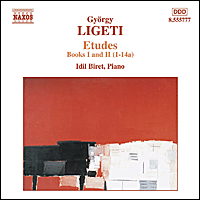
Etudes Books I & II Composer: Gyorgy Ligeti Performer: Idil Biret, piano Naxos - #8555777 Ligeti wrote this series of fifteen studies over a period of ten years beginning in the 1980s and the result is one of its great masterworks of the keyboard. Not for the timid, these pieces take the pianist's skill to levels that border on the impossible. Idil Biret meets the challenges head-on and delivers an extraordinary performance. Highly recommended. |
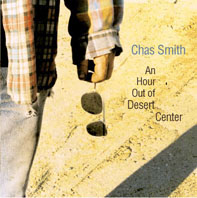
An Hour Out of Desert Center Composer: Chas Smith Cold Blue Music CB0013 Chas Smith is a composer, inventor, instrument builder, and performer from the Harry Partch tradition who creates his own musical world, complete with its own instruments he makes himself or finds. as well as a "language" His is a world of carefully sculpted textures that never sit absolutely still, textures that evolve and are always in the process of a slow change of aural perspective. Critics have frequently compared Smith’s sometimes beautiful, sometimes brooding compositions to those of Ligeti. The three pieces on this new recording feature the composer performing on pedal steel guitars, composer-designed-and-built crotales and sound sculptures, zithers, and a 1948 Bigsby lap guitar. |
 |
Search WWW Search www.sequenza21.com |
